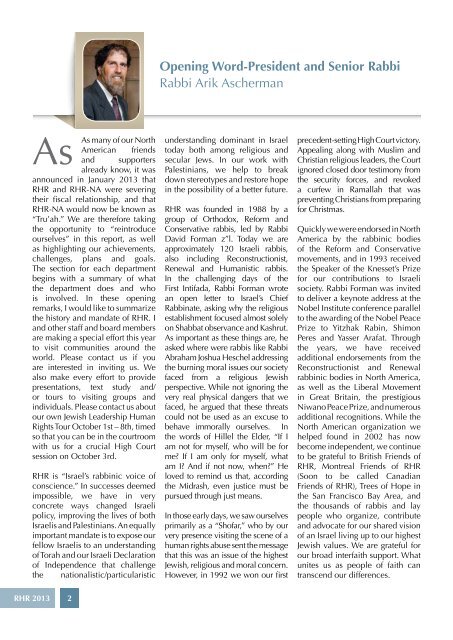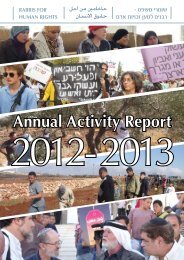Rabbis For Human Rights: The Annual Report 2012-2013
Rabbis For Human Rights: The Annual Report 2012-2013
Rabbis For Human Rights: The Annual Report 2012-2013
Create successful ePaper yourself
Turn your PDF publications into a flip-book with our unique Google optimized e-Paper software.
As<br />
As many of our North<br />
American friends<br />
and supporters<br />
already know, it was<br />
announced in January <strong>2013</strong> that<br />
RHR and RHR-NA were severing<br />
their fiscal relationship, and that<br />
RHR-NA would now be known as<br />
“Tru’ah.” We are therefore taking<br />
the opportunity to “reintroduce<br />
ourselves” in this report, as well<br />
as highlighting our achievements,<br />
challenges, plans and goals.<br />
<strong>The</strong> section for each department<br />
begins with a summary of what<br />
the department does and who<br />
is involved. In these opening<br />
remarks, I would like to summarize<br />
the history and mandate of RHR. I<br />
and other staff and board members<br />
are making a special effort this year<br />
to visit communities around the<br />
world. Please contact us if you<br />
are interested in inviting us. We<br />
also make every effort to provide<br />
presentations, text study and/<br />
or tours to visiting groups and<br />
individuals. Please contact us about<br />
our own Jewish Leadership <strong>Human</strong><br />
<strong>Rights</strong> Tour October 1st – 8th, timed<br />
so that you can be in the courtroom<br />
with us for a crucial High Court<br />
session on October 3rd.<br />
RHR is “Israel’s rabbinic voice of<br />
conscience.” In successes deemed<br />
impossible, we have in very<br />
concrete ways changed Israeli<br />
policy, improving the lives of both<br />
Israelis and Palestinians. An equally<br />
important mandate is to expose our<br />
fellow Israelis to an understanding<br />
of Torah and our Israeli Declaration<br />
of Independence that challenge<br />
the nationalistic/particularistic<br />
Opening Word-President and Senior Rabbi<br />
Opening Word<br />
Rabbi Rabbi Arik Arik Ascherman<br />
understanding dominant in Israel<br />
today both among religious and<br />
secular Jews. In our work with<br />
Palestinians, we help to break<br />
down stereotypes and restore hope<br />
in the possibility of a better future.<br />
RHR was founded in 1988 by a<br />
group of Orthodox, Reform and<br />
Conservative rabbis, led by Rabbi<br />
David <strong>For</strong>man z”l. Today we are<br />
approximately 120 Israeli rabbis,<br />
also including Reconstructionist,<br />
Renewal and <strong>Human</strong>istic rabbis.<br />
In the challenging days of the<br />
First Intifada, Rabbi <strong>For</strong>man wrote<br />
an open letter to Israel’s Chief<br />
Rabbinate, asking why the religious<br />
establishment focused almost solely<br />
on Shabbat observance and Kashrut.<br />
As important as these things are, he<br />
asked where were rabbis like Rabbi<br />
Abraham Joshua Heschel addressing<br />
the burning moral issues our society<br />
faced from a religious Jewish<br />
perspective. While not ignoring the<br />
very real physical dangers that we<br />
faced, he argued that these threats<br />
could not be used as an excuse to<br />
behave immorally ourselves. In<br />
the words of Hillel the Elder, “If I<br />
am not for myself, who will be for<br />
me? If I am only for myself, what<br />
am I? And if not now, when?” He<br />
loved to remind us that, according<br />
the Midrash, even justice must be<br />
pursued through just means.<br />
In those early days, we saw ourselves<br />
primarily as a “Shofar,” who by our<br />
very presence visiting the scene of a<br />
human rights abuse sent the message<br />
that this was an issue of the highest<br />
Jewish, religious and moral concern.<br />
However, in 1992 we won our first<br />
precedent-setting High Court victory.<br />
Appealing along with Muslim and<br />
Christian religious leaders, the Court<br />
ignored closed door testimony from<br />
the security forces, and revoked<br />
a curfew in Ramallah that was<br />
preventing Christians from preparing<br />
for Christmas.<br />
Quickly we were endorsed in North<br />
America by the rabbinic bodies<br />
of the Reform and Conservative<br />
movements, and in 1993 received<br />
the Speaker of the Knesset’s Prize<br />
for our contributions to Israeli<br />
society. Rabbi <strong>For</strong>man was invited<br />
to deliver a keynote address at the<br />
Nobel Institute conference parallel<br />
to the awarding of the Nobel Peace<br />
Prize to Yitzhak Rabin, Shimon<br />
Peres and Yasser Arafat. Through<br />
the years, we have received<br />
additional endorsements from the<br />
Reconstructionist and Renewal<br />
rabbinic bodies in North America,<br />
as well as the Liberal Movement<br />
in Great Britain, the prestigious<br />
Niwano Peace Prize, and numerous<br />
additional recognitions. While the<br />
North American organization we<br />
helped found in 2002 has now<br />
become independent, we continue<br />
to be grateful to British Friends of<br />
RHR, Montreal Friends of RHR<br />
(Soon to be called Canadian<br />
Friends of RHR), Trees of Hope in<br />
the San Francisco Bay Area, and<br />
the thousands of rabbis and lay<br />
people who organize, contribute<br />
and advocate for our shared vision<br />
of an Israel living up to our highest<br />
Jewish values. We are grateful for<br />
our broad interfaith support. What<br />
unites us as people of faith can<br />
transcend our differences.<br />
In 1995, Rabbi Jeremy Milgrom and<br />
I succeeded Rabbi Ehud Bandel<br />
as co-directors. We developed<br />
a grassroots component to our<br />
work, succeeding in changing<br />
national policy by having one foot<br />
on the ground and the other in the<br />
corridors of power.<br />
In 1995, 95 percent of our work<br />
concerned Palestinians. Based<br />
on the Torah’s teaching that all<br />
human beings are created in God’s<br />
Image, RHR’s general assembly<br />
resolved that we must always be<br />
advocating for the human rights<br />
of both Jews and non-Jews. Today,<br />
the OT remains our largest single<br />
commitment, but it now represents<br />
less than 50 percent of our time<br />
and resources. While we wish we<br />
could put ourselves out of business<br />
by ending human rights violations,<br />
your increased support allowed<br />
us to grow our educational and<br />
internal Israeli socioeconomic<br />
justice work without backtracking<br />
on our commitment to Palestinian<br />
human rights. When I began, the<br />
entire budget was under $30,000.<br />
Today our projected <strong>2013</strong> budget<br />
is over $1,300,000.<br />
RHR is not affiliated with any<br />
political party. We have no position<br />
on borders or final status solutions.<br />
We state clearly that the Occupation<br />
leads to human rights violations, but<br />
leave it to others to determine just<br />
what ending the Occupation will<br />
look like. In terms of socioeconomic<br />
justice inside Israel, we struggle<br />
against the changes in our society<br />
created by the move from a social<br />
welfare economy towards a neoliberal<br />
economy.<br />
We achieve change through<br />
direct field work, the Israeli legal<br />
system, lobbying our Knesset and<br />
government, public campaigns<br />
and working with the international<br />
community. As a last resort, we<br />
have occasionally engaged in acts<br />
of civil disobedience.<br />
<strong>The</strong> following report will give<br />
you a good picture of RHR’s<br />
current project areas and future<br />
plans. I reflected after leaving the<br />
directorship in the capable hands of<br />
Ayala Levy in 2010 that it is clearer<br />
than ever that we are not “Rabbi<br />
for <strong>Human</strong> <strong>Rights</strong>,” but “<strong>Rabbis</strong><br />
for <strong>Human</strong> <strong>Rights</strong>.” <strong>The</strong> fact is that,<br />
while our organization is clearly a<br />
rabbinic organization, our staff is<br />
also interfaith. I was almost moved<br />
to tears at a recent meeting with<br />
an outside evaluator listening to<br />
their passion, commitment and<br />
dedication. <strong>The</strong>re are certain things<br />
that money cannot buy, and are<br />
difficult to define, but they make<br />
all the difference when the chips<br />
are down and the call comes in<br />
after hours.<br />
Finally, I have been reflecting a great<br />
deal lately about what is the essence<br />
of Jewish-based human rights work.<br />
Clearly our first goal is to create a<br />
society which acts according to<br />
our belief that all human beings are<br />
created in God’s Image. We must<br />
develop the “Spiritual vision” that<br />
can see through all that divides<br />
us, including real conflicts, and<br />
sometimes justified anger and fear.<br />
<strong>The</strong> breastplate the High Priest’s<br />
wore when he entered the Holy<br />
of Holies contained 12 different<br />
stones representing the 12 tribes.<br />
We must go even further. We<br />
achieve holiness when there is a<br />
place for all humanity in our hearts<br />
because we recognize the essential<br />
sameness that unites us in our<br />
diversity. We must be aware of how<br />
unequal power relationships lead<br />
to human rights violations. Ibn Ezra<br />
warns us that when we wrong the<br />
widow, the orphan or the resident<br />
alien, they are all too often voiceless<br />
and powerless to protest. Rabbi<br />
Samson Raphael Hirsch taught that,<br />
even with the best of intentions,<br />
it “Borders on criminality” when<br />
those with property and power<br />
take on the “White man’s burden”<br />
of deciding how to be just towards<br />
those who do not sit at the table.<br />
Rather than saying that they are<br />
powerless, some versions of Ibn<br />
Ezra say that the widow, orphan<br />
and alien have nobody to stand by<br />
their side. We must be those who<br />
stand by their side. But we must do<br />
so as partners, empowering them<br />
to find their own voice.<br />
I look forward to better explaining<br />
what I mean when I have the<br />
opportunity to visit your community,<br />
or to welcome you here in Israel.<br />
B’Vrakha (In Blessing),<br />
Arik<br />
RHR <strong>2013</strong> 2<br />
3 RHR <strong>2013</strong>









